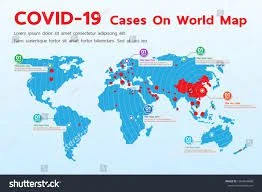 The total number of global COVID-19 cases surpassed 100 million today, marking a somber milestone in the ongoing pandemic that has disrupted lives, economies, and healthcare systems worldwide. According to data compiled by the World Health Organization (WHO) and national health authorities, the virus has now affected virtually every country on the planet, with the number of infections continuing to rise.
The total number of global COVID-19 cases surpassed 100 million today, marking a somber milestone in the ongoing pandemic that has disrupted lives, economies, and healthcare systems worldwide. According to data compiled by the World Health Organization (WHO) and national health authorities, the virus has now affected virtually every country on the planet, with the number of infections continuing to rise.
The pandemic, which was declared by WHO in March 2020, has led to a global health crisis not seen in recent history. The virus has resulted in more than 2.2 million deaths and triggered severe economic, social, and healthcare challenges.
As of today, the United States, India, and Brazil continue to report the highest number of cases, with the U.S. alone accounting for over 25 million infections. The emergence of new variants of the virus in countries such as the UK, South Africa, and Brazil has heightened concerns about increased transmissibility and the potential for further strain on healthcare systems.
Dr. Tedros Adhanom Ghebreyesus, Director-General of WHO, spoke at a press briefing, acknowledging the grim milestone while calling for global solidarity in the fight against the virus. “Reaching 100 million cases is a stark reminder of the severity of this pandemic, but it also reinforces the importance of a united global response. We need to continue working together to save lives and ensure equitable access to vaccines,” Dr. Tedros said.
Vaccination campaigns have begun in many parts of the world, offering a glimmer of hope for bringing the pandemic under control. However, vaccine distribution remains uneven, with wealthier nations securing the bulk of available doses while lower-income countries await access. The WHO’s COVAX initiative aims to address this inequality by ensuring fair access to vaccines for all countries, regardless of income.
Despite ongoing vaccination efforts, health experts caution that the virus continues to pose a serious threat. Preventive measures, including mask-wearing, social distancing, and travel restrictions, remain essential to curbing the spread of the virus.
As countries grapple with the challenges posed by new variants and the logistical difficulties of vaccine distribution, the global response to COVID-19 remains critical in shaping the course of the pandemic in the months ahead.



















